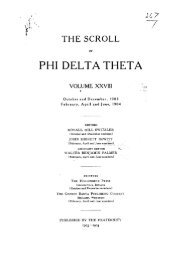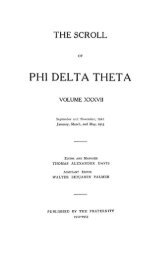1993 Volume 116 No 1–4 - Phi Delta Theta Scroll Archive
1993 Volume 116 No 1–4 - Phi Delta Theta Scroll Archive
1993 Volume 116 No 1–4 - Phi Delta Theta Scroll Archive
You also want an ePaper? Increase the reach of your titles
YUMPU automatically turns print PDFs into web optimized ePapers that Google loves.
<strong>Phi</strong>s lead Rotary International<br />
Group Study Exchange Teams<br />
Above: Eighteen members of<br />
Texas Epsilon's 1969 <strong>Phi</strong>keia<br />
class met for a reunion at<br />
Horseshoe Bay Resort outside<br />
of Austin, Texas, over<br />
Memorial Day weekend,<br />
(back) R. King, K Perkins, J.<br />
Little, M. Leaverton, T.<br />
Mclntyre, R. Hurst, M.<br />
Scarborough, B. Craig, T.<br />
Fields, P. Swatzell; (front) R.<br />
Black, D. Flesher, D. Schilap,<br />
M. Hazelwood, M. Stnipp,<br />
and P. Barney.<br />
Two <strong>Phi</strong>s had the rare opportunity of leading one of Rotary International's Group Study Exchange<br />
Teams. Dr. Edward G.Whipple, Hanover '74, General Council president, led District 5390 (Montana)<br />
to France this past spring. Robert J. Miller, New Mexico '50, <strong>Phi</strong> <strong>Delta</strong><strong>Theta</strong> Foundation<br />
president, led District 6670 in southwestern Ohio to South Africa in the fall of 1992.<br />
More than 435 of these exchanges occurred<br />
this year between Rotary districts<br />
world-wide. The program, totally funded by<br />
the Rotary International Foundation, seeks to<br />
improve international understanding and<br />
good will.Teams examine the district's way of<br />
life—economic, political, social, cultural, and<br />
its history.<br />
Teams are composed of up to six members.The<br />
team leader is a Rotarian from the<br />
district.The other members are non-<br />
Rotarians, between the ages of 25 - 35,<br />
representing an array of professional occupations.<br />
The program is varied, visiting different<br />
towns and cities.Team members live in<br />
Rotarians' homes assimilating into the host<br />
district's life, exchanging ideas, and establishing<br />
lasting relationships.<br />
Dr.Whipple's team traveled to France's<br />
<strong>No</strong>rmandy- Picardy region April 12 - May 27.<br />
The French team had visited Montana the<br />
previous year.The team was composed of an<br />
attorney, social worker, graphic artist, and<br />
nurse.The team stayed in nine different cities<br />
and came in contact with 24 French Rotary<br />
clubs.<br />
Cities included Rouen, Dieppe, Fecamp,<br />
Deauville, Bayeux, Cherbourg, Avranches,<br />
Caen, and Alencon.The team visited numerous<br />
historical sites. As <strong>No</strong>rmandy was the<br />
site of the D-Day invasion, time was spent at<br />
Arromanches and Omaha Beach. The famous<br />
Mont St. Michel was also a high point Dr.<br />
Above: Team<br />
member Drew<br />
Hildebrand and<br />
Scott Miller, a<br />
Miami U.<br />
graduate in charge<br />
of water park<br />
installation at<br />
Lost City,<br />
Bophuthatswana,<br />
with Bob Miller;<br />
right: Dr Whipple<br />
next to a World<br />
War II bomb still<br />
lodged in the <strong>No</strong>tre<br />
Dame Cathedral<br />
Whipple spent much time at various educational institutions and had the opportunity to teach for<br />
a day at the Universite de Caen, where he had studied as an undergraduate.The team visited such<br />
sites as a nuclear power plant, the Renault automobile factory, and the Haras National du Pin, the<br />
internationally famous French horse racing breeding farm.<br />
Brother Miller's team visited 18 Rotary Clubs in South Africa. In addition, the team toured<br />
three mines, attended three civic receptions, went to four universities, and went on safari in<br />
Kruger National Park.They also watched a production of "A Chorus Line" and toured Sun City<br />
and Lost Cities. Aside from signs of increased security in Johannesburg, the team saw little evidence<br />
of violence or political turmoil. Team members learned that many of their hosts were<br />
against aparteid and were prepared for black African rule. Midway through the visit, Brother<br />
Miller's team met with the South African Exchange Team before its departure to Cincinnati.<br />
As a follow up to the Group Study Exchange, team members will be speaking throughout the<br />
year to Rotary clubs about their experiences. •<br />
FaU <strong>1993</strong> 187

















